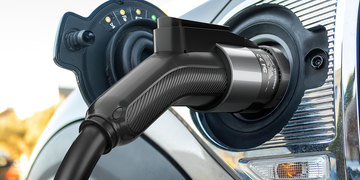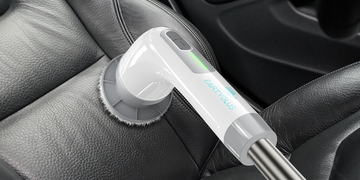What types of electric vehicle charger adapters are there? Electric vehicle charger adapters come in various types, each serving a specific purpose to enhance compatibility between different charging stations and electric vehicles. Here are some common types of electric vehicle charger adapters:
J1772 connector Type 1:
The SAE J1772 connector, commonly referred to as a Type 1 connector, is a charging standard for electric vehicles prevalent in North America and Japan. It boasts of five pins and has the capacity to charge up to 80 amps using 240 volts input, with a maximum power output of an impressive rate. This charging solution is suitable for Level 1 and Level 2 EV chargers that rely on single-phase AC charging.
Type 1 to Type 2 Adapters:
Purpose: Facilitates compatibility between Type 1 and Type 2 charging connectors.
Applications: Useful in regions where both Type 1 and Type 2 connectors are prevalent, providing flexibility for EV owners with different plug types.
Type 2 to Type 1 Adapters:
Purpose: Allows Type 2-equipped EVs to charge at Type 1 charging stations.
Applications: Useful for EV owners with Type 2 vehicles in regions where Type 1 charging infrastructure is more common.
CHAdeMO to CCS Adapters:
Purpose: Enables compatibility between CHAdeMO and CCS (Combined Charging System) connectors, allowing EVs to use either charging standard.
Applications: Valuable for EV owners who want the flexibility to charge at CHAdeMO or CCS stations, prevalent in different parts of the world.
Tesla Adapters:
Purpose: Converts Tesla's proprietary charging connector to other standards, such as CHAdeMO or CCS.
Applications: Useful for Tesla owners who want to access non-Tesla charging infrastructure or for EV users with different connector types visiting Tesla Supercharger stations.
NEMA Adapters:
Purpose: Allows EV owners to connect their vehicles to various NEMA outlets commonly found in North America.
Applications: Useful for adapting to different NEMA outlet types, offering flexibility in charging locations, particularly in residential settings.
Type 2 Extension Cables:
Purpose: Extends the reach of Type 2 charging cables, providing added flexibility in various charging scenarios.
Applications: Useful when the distance between the EV and the charging station requires an extension for a more convenient charging experience.
European to U.S. Adapters:
Purpose: Adapts European-style connectors to U.S. standards and vice versa.
Applications: Beneficial for EV owners traveling between continents, ensuring compatibility with diverse charging infrastructures.
Different Levels of EV Charging Plugs
Level 1, Level 2, and Level 3 are the different EV charging levels. Since more electricity is provided to the car at higher charging levels, the charging process moves along more quickly. Due to the fact that each EV may take a range of power levels from the charger, various EVs charge at varying rates on each level.
Before the charger is turned on when an electric car is plugged in, there is a communication procedure. In essence, the vehicle checks with the charger how much power it can supply before requesting the maximum amount the station is capable of delivering. You don’t need to be concerned about using a charging station that can supply more electricity than your electric vehicle can manage.

How do I know which connector my electric vehicle uses?
All electric vehicles utilize the connection plug that is accepted as normal in their respective industries for level 1 and level 2 charging. Tesla offers a private infrastructure of Supercharger locations that are solely accessible to Tesla automobiles. In order to utilize Tesla Level 1 or Level 2 charging stations, non-Tesla electric cars must have an adaptor, which may be acquired from a third-party seller. No adaptor will function on these stations for DC rapid charging due to the verification procedure.
There are mobile applications that identify every EV charging station that is open to the public and describe the connection or socket type. The industry-standard connection that your EV utilizes will be included with every piece of charging equipment available in your market. It will be the J1772 in North America and the Type 2 in Europe.
Telgeoot J1772 to Tesla EV Charger Adapter for Tesla Model 3 Y S X 80A/240 VAC
Seamless Compatibility: our tesla J1772 adapter is meticulously engineered to seamlessly connect your Tesla to the thousands of J1772 charging stations. Say goodbye to charging constraints and hello to a broader charging network.
Compact and User-Friendly
The structure was tested after being repeatedly crushed by cars. Our Tesla J1772 Adapter is designed to be sleek and user-friendly. It's compact, easy to handle, Strong resistance to stress, and fits seamlessly into your charging routine.
IP55 Protection Grade
Strong and Durable: Built with premium PC material, Rated at 240V, 80A Max, IP55 protection grade, Can Been using this outside in all weather.
What types of electric vehicle charger adapters are there? It's crucial to understand the distinctions between these different kinds of electric vehicle connectors, regardless of the type of EV you drive. The quantity of electricity that each plug can deliver varies depending on the cars it is compatible with. It's important for electric vehicle owners to be aware of the specific charging standards and connector types used in their region and to carry the necessary adapters when traveling to ensure a seamless charging experience.





